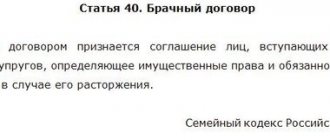Far-sighted spouses today prefer to draw up a marriage contract, which regulates certain aspects of family life and, especially, determines the regime of marital property. But what if one of the parties to the agreement passes away? Let's figure out how a marriage contract works in the event of the death of one of the spouses, and where you may need the help of a lawyer in Moscow.
- Property after death
- Marriage contract and inheritance
- How to apply a marriage contract when inheriting
The history of the appearance of the marriage contract, how it appeared in Russia
When you get married, you feel nothing but great excitement, joy, love and happiness.
A wedding is a significant event, responsible and festive. At these moments you don’t think about profit or other material benefits. But sometimes life can change dramatically. Now you are celebrating at the wedding table, and tomorrow you are redistributing joint property in court. How to avoid a humiliating division of property and how to defend your dignity?
One of the cultural ways to resolve conflict is to draw up a marriage contract.
A marriage contract, or contract, is a discovery of foreign legislators. They first appeared in the 17th century in England. The purpose of the agreements was to protect the right of a married woman and her close relatives to family property. Drawing up such contracts is a common practice for those wishing to get married from all over the world. If you agree with your spouse on everything, then why not write a few clauses into the contract, rather than defend your share through long legal battles at great expense.
In 1995, it was adopted into the Family Code of the Russian Federation, and a definition of a marriage contract appeared in it as an agreement between persons entering into a marriage, or an agreement between spouses, establishing the property rights and obligations of spouses in marriage and/or upon its dissolution (Article 40 of the Family Code of the Russian Federation) .
Article 256 of the Civil Code of the Russian Federation establishes a provision according to which property acquired by spouses during marriage is their joint property, unless an agreement between them establishes a different regime for this property. Thus, the spouses have the right to draw up an agreement defining exactly what things belong to each of them, and it is not at all necessary that the value of the spouses’ shares be equal. Following the Civil Code of the Russian Federation, which establishes this provision, the RF IC in Chapter Eight regulates the general procedure for concluding, amending, terminating a marriage contract, as well as general requirements for the content of a marriage contract and the conditions for invalidating a marriage contract.
Marriage contracts take root with difficulty in our country - prejudices towards marriage contracts
Firstly, until now, a marriage contract has been attributed to such manifestations of human nature as self-interest and mistrust. Entering into a marriage of convenience has always been considered as something unrighteous and bad. Many families are created based on mutual attraction. The newlyweds assure each other of endless love. And no one wants to think about bad things near the altar. Secondly, there was no need to formalize a marriage contract in a country where a significant number of citizens did not own personal property. Such families have nothing to share except children during a divorce. The apartment could have become an important item, but it was state-owned. Thirdly, many are afraid of the process of concluding a contract, because... it must be certified by a notary (clause 2 of article 41 of the IC). It follows from this that the notary can request the provision of all kinds of documents confirming certain rights to property. This circumstance often leads to the fact that couples who decide to enter into a marriage contract postpone the conclusion of the contract indefinitely or refuse to conclude it due to paper bureaucracy. Fourthly, not all newlyweds have at least a minimum amount of information in this area.
Regulatory framework
| Legislative acts | List of articles |
| Family code | Article 42 describes the list of legal relations included in the subject of the marriage agreement. Article 43 describes the reasons and methods for terminating the contract. |
| Civil Procedure Code | Article 132 establishes a list of additional documents that are appendices to the statement of claim. |
| Tax Code (Part 2) | Article 333.19 – state duty for legal actions. Article 333.24 – state duty for notarial acts. |
| Civil Code (part 3) | Article 1111 establishes 2 grounds of inheritance. Article 1118 establishes the general provisions regarding wills. Article 1150 describes the rights of the surviving spouse to the estate of the deceased spouse. |
| Civil Code (part 1) | Chapter 9 paragraph 2 describes the grounds for invalidity of contracts. |
Advantages of a prenuptial agreement
However, we should not forget about the advantages of prenuptial agreements. With their help, you can bypass marriages for the sake of property. It is not so rare that there are cases when one party is successfully running a business, while the other is still studying. If you first stipulate that your spouse does not claim the second half of your space, there may not be a wedding. Prenuptial agreements also reduce the number of marriages with large age gaps.
A marriage contract does not provoke divorce, but on the contrary, in many cases it prevents it. Since, if in a non-contractual family a husband or wife can separate without holding back their emotions, then with a marriage contract you will think: Because in this case, each of the spouses loses the corresponding part of the joint property. The number of divorces due to suspicious reasons will also decrease. If the marriage contract is drawn up correctly, taking into account the interests of both parties, the spouses will not even think about divorce. And upon divorce, each spouse will spend considerable money to achieve freedom.
Allocation of spousal share from inheritance
The procedure for dividing an inheritance involves the alienation of the share belonging to the living spouse, as well as the allocation of a part intended for obligatory legal successors. This is where the prenuptial agreement is key. There is no need to allocate a share if the text of the document refers to the voluntary choice of a separate property ownership regime. The notary does not include the spousal share. At the same time, competitors often do not like this division of the inheritance. Then the conflict will have to be resolved in court.
When can a marriage contract be concluded and what property should be specified?
A marriage contract can be concluded both before the state registration of a marriage and at any time during the marriage. If the agreement is concluded before the state registration of the marriage, then it comes into force only from the date of state registration of the marriage.
The agreement is concluded in writing, subject to notarization and can be changed or terminated at any time by agreement of the spouses or at the request of one of the spouses in court.
When entering into a contract, it is a good idea to stipulate that premarital property will remain the property of the true owner after a divorce. In addition, it is possible to draw up an agreement not only for property owned by the spouses, but also for property that will appear in the future. In this case, it is possible to determine the shared ownership regime, i.e. divide property not yet acquired in advance.
State duty amount
If the plaintiff does not make property claims, then he must pay a fee of 300 rubles.
If there are property claims, in addition to the 300 rubles paid for the consideration of the case on dissolution of the marriage contract, you must pay a state fee calculated on the basis of the price of the plaintiff’s claims.
| The amount of the plaintiff's claims | Calculation formula |
| Below 20,000 rub. | 4 percent of the plaintiff's claim is charged. If this amount is below 400 rubles, then the applicant pays 400 rubles. |
| 20,001-100,000 rub. | 3 percent of the amount of the plaintiff’s claims over 20,000 rubles, to which 800 rubles are added. |
| 100,001-200,000 rub. | 2 percent of the amount of the plaintiff’s claims over 100,000 rubles, to which 3,200 rubles are added. |
| 200,001-1,000,000 rub. | 1 percent of the amount of the plaintiff’s claims over 200,000 rubles, to which 5,200 rubles are added. |
| Above 1,000,000 rub. | 0.5 percent of the amount of the plaintiff’s claims, to which 13,200 rubles are added. If the amount received is above 60,000 rubles, then the applicant pays 60,000 rubles. |
Regime of property of spouses in the absence of a marriage contract
Let's take a closer look at how property is divided in a family without a marriage contract. If the spouses, having entered into marriage, have not drawn up a prenuptial agreement, joint property begins to form between them. Consequently, the common joint property of spouses is determined only in cases established by law, which is why it is called “joint property.” According to paragraph 2 of Art. 34 of the RF IC, the joint property of spouses includes real estate and movable property acquired at the expense of the spouses’ common income, as well as other property acquired during the marriage, regardless of the acquirer. The concept of joint ownership lies in Articles 244, 256 of the Civil Code of the Russian Federation. Joint property of spouses is property acquired during marriage (relationships registered legally). Without registration, family life does not form joint property of the spouses. The disposal, use and ownership of joint property is done only by mutual consent of the spouses. When one of the spouses uses common property, it is assumed that he is acting with the permission of the other spouse.
The legislator monitors only real estate transactions. To complete a transaction with real estate and a transaction that requires notarization, it is necessary to take the consent of the spouse certified by a notary. If it is not there, the other spouse has the right to seek recognition of the transaction as invalid. The legal status of joint property of spouses is quite common, because takes into account the interests of most married couples. The income of most women is still significantly lower than that of the stronger sex, they are more often fired from work, and the presence of minor children makes it difficult to find a job. As a result, formally removed discrimination still exists. All property acquired during marriage is community property, regardless of the law that contains the list of community property. To exclude certain property, a direct indication of this is required. It is necessary to stipulate that this property is the separate property of one of the spouses. Therefore, the existence of a marriage presupposes joint ownership of property acquired by the spouses during the marriage.
Wedding gifts - common property or individual property (of one of the spouses)
Most people ask what wedding gifts are. Since they are targeted, individual property should be determined to the spouse to whom the gift is addressed. If the gifts have a family purpose, i.e. without specifying a specific addressee, they fall under the joint property of the spouses. In case of joint property, as stated in paragraph 3 of Art. 34 of the RF IC, a family member who ran a household, looked after children, or for other valid reasons was not able to have independent income, has an equal right to joint property, like a working spouse. Even in a situation where one of the spouses did not participate in the accumulation of joint property at all, this still does not reduce his rights.
On November 30, 1994, Part 1 of the Civil Code of the Russian Federation came into force. The people were told that property acquired by spouses during marriage is called their joint property, unless a contract between them provides for a different regime for this property (Article 256 of the Civil Code). In addition, the Civil Code of the Russian Federation did not explain in any way what kind of agreement this was, nor the conditions for its execution and termination, nor the relations regulated by it. Only on March 1, 1996, when the RF IC came into force, the marriage contract received the necessary legal status and the legal framework was put in place.
The concept of the Contractual regime is not given in the RF IC, but its meaning and content are given quite fully with the help of a description of the marriage contract. It should be noted that the mere execution of a marriage contract does not mean that property acquired during marriage will not fall under the legal regime. The bottom line is that spouses do not always decide the fate of their property through a marriage contract; they often reach an agreement only on the most important issues, from their point of view (for example, the division of real estate). In general, a change in the regime will occur if, in the marriage contract, the spouses divide the acquired property together and accept an agreement on the distribution of all income that the family will acquire in the future. In other cases, the contractual regime will work exclusively in relation to the property about which an agreement was reached in the marriage contract.
What conditions can be defined in a marriage contract?
Spouses have the right to determine in a marriage contract:
- their rights and obligations regarding mutual maintenance;
- the procedure for using each other's income;
- the order of responsibility of each of them for family expenses;
- establishing the property transferred to each spouse after divorce.
For example, you can agree that the income received by the family will be the property of one of the spouses. In return, the second spouse receives ownership of any family property.
As stated in Art. 37 of the RF IC, the property of each of the spouses can be considered joint if it is determined that during the marriage, thanks to the common property of family members or the property of each of the spouses or the work activity of one of the spouses, investments have been made that radically increase the value of this property (reconstruction, major repairs, re-equipment and etc.).
What cannot be specified in a marriage contract
Do not forget about what conditions cannot be included in the contract when concluding it.
The law prohibits limiting the legal capacity or capacity of spouses by a marriage contract. It is impossible, for example, to write in a contract that the wife does not have the right to work, or accept an inheritance, or write poetry, or go shopping, or establish enterprises. The right to go to court to protect one’s violated rights cannot be waived in a contract.
The contract cannot contain conditions regulating personal non-property relations between spouses, for example, conditions on the spouses’ choice of surname, choice of place of residence; the right to decide jointly all issues of family life; on the right to divorce; conditions cannot be contained on the rights and obligations of spouses in relation to children, etc.
- the marriage contract is not capable of regulating the personal non-property relations of the spouses;
- cannot affect the rights and obligations of spouses regarding their children;
- cannot limit the legal capacity and capacity of spouses. Those. each of the spouses is able to apply to the court with a claim for termination, modification, or recognition of the loss of force of the marriage contract;
- cannot prohibit doing business, making a profit, bequeathing an inheritance, etc.
The marriage contract is drawn up in writing and, according to the RF IC, is subject to notarization. The agreement can be amended or terminated by mutual agreement of the parties at any time. In this situation, the spouses draw up in writing an agreement to terminate or amend the marriage contract and have it certified by a notary. You cannot unilaterally refuse a marriage contract. If such a refusal occurs, the other spouse may sue to enforce the contract.
List of documents for filing a claim
This list includes:
A check or other document confirming payment of the duty.- Marriage agreement (original).
- A proposal to terminate the contract signed by the defendant or a notification of receipt of the proposal by the defendant.
- A certificate confirming the death of the testator.
- Certificate of marriage or divorce.
- Evidence that confirms the plaintiff’s position, for example, testimony of witnesses (testimony of the use of violence against a party to the contract); expert opinions (medical report on the incapacity of the testator or party to the marriage contract); material evidence (the weapon of a crime against the testator or party to the contract); written documents (certificates from government agencies).
Invalidity of the marriage contract
A marriage contract may be considered invalid in whole or in part on the following grounds:
- if the marriage contract does not comply with current legislation;
- if the marriage contract is drawn up for a purpose contrary to the fundamentals of law and order and morality;
- if the marriage contract was concluded without the intention of creating a family;
- if the marriage contract is drawn up by a citizen who has been determined by a court to be incompetent due to alcohol abuse or the use of narcotic substances;
- if the marriage contract was concluded under the influence of a mistake;
- if one of the parties to the marriage contract is a citizen declared incompetent due to mental illness.
- if, when concluding the contract, one of the spouses was unable to understand the meaning of his actions or was mistaken, signed the contract under the influence of deception, violence, threat or a combination of difficult circumstances. Such an agreement is declared invalid by the court at the request of the victim;
- in the event of a marriage being declared invalid. In this case, the provisions of the Civil Code on shared ownership apply to property acquired jointly by persons whose marriage is declared invalid. However, the court has the right to recognize, when dividing jointly acquired property, the right of joint, rather than shared, ownership of the spouses to the specified property, provided that this is required by the interests of a bona fide spouse; if the agreement contains conditions that put one of the spouses in an extremely unfavorable position or contradict the basic principles of family law;
- if the agreement is concluded only for show or in order to hide another transaction, for example, to register or get an apartment.
So, if you have calculated all the advantages and disadvantages and decided to act, i.e. When drawing up a marriage contract, take into account one important piece of advice. The prenuptial agreement should be as flexible as possible. The more variations in the development of the situation and possible emergency circumstances are calculated in it, the less it will be necessary to resort to it for changes.
Drawing up a marriage contract is not an easy task, requiring knowledge in various branches of law. Choose a qualified specialist who can predict all your interests and correctly implement them on paper.










